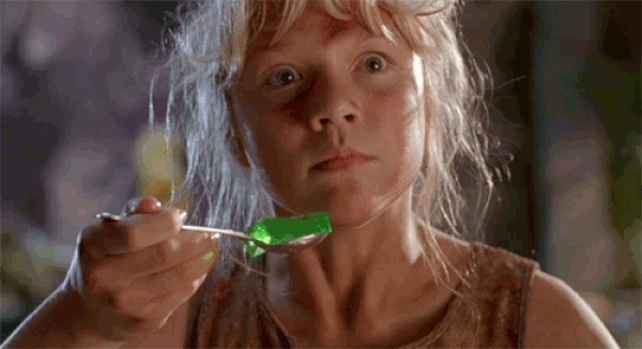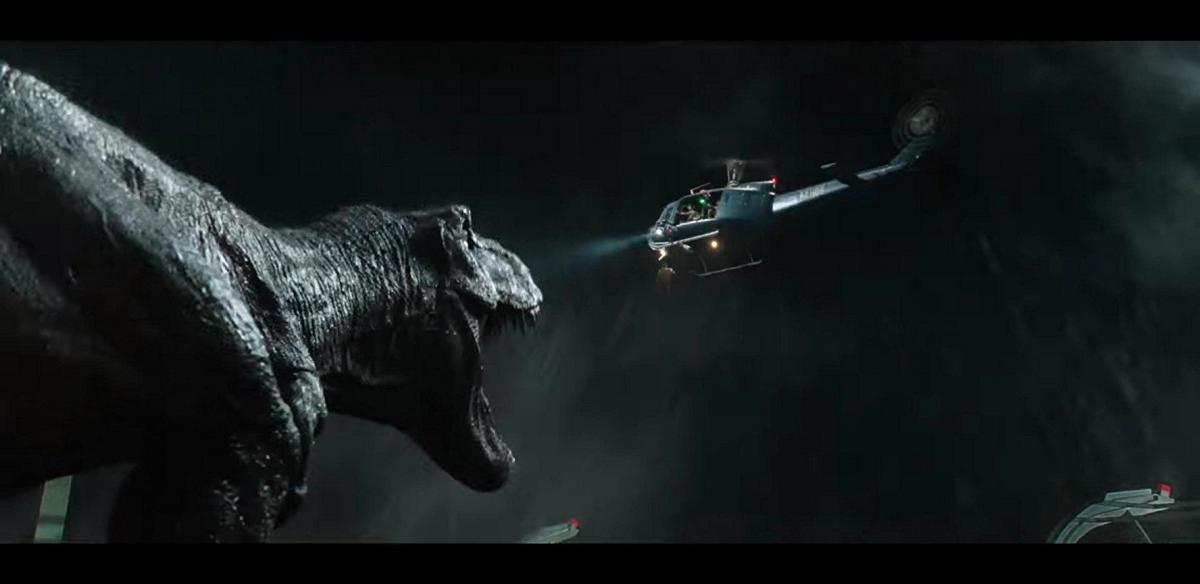
Here's Why 'Jurassic World: Fallen Kingdom' Looks Like A Terrible Idea
Wednesday, February 14, 2018

Jurassic Park was the first movie I saw three times in the theater. I was just about to turn 12 when it came out. I ended up watching it in two different countries. It remains one of my favorite movies of all time still to this day.
I can still recall almost every scene in the film since each scene is so memorable. Even before things went to hell, the movie was captivating. The moment when Dr. Grant and Ellie see the dinosaurs for the first time, I remember feeling that same sense of awe. Even the film's dialogue is impossible to forget. "Where's the goat?" "Clever girl..." "Life uh.... finds a way." "Hold on to your butts."
So many great lines.
Meanwhile, the scary scenes are palpable. The T. rex smashing the jeep with Lex and Tim inside. The kids hiding in that kitchen with the velociraptors hunting them, cruel and calculated and terrifying. Ellie turning on the back-up power (after finding Arnold's arm) and then running, limping, from the terrifying creatures. Scattered throughout these terrifying moments are bits of silliness, as well, like when Tim gets zapped by the electric fence. And bits of sentimentality, like when Hammond describes his flea circus.
Jurassic Park was a masterpiece. Excellent characters, clever writing, and some of the best, most frightening and tense scenes ever for a family-friendly horror movie. Oh, and a score that has become one of the most iconic ever written. I suspect you can hum it to yourself right now without even trying. The horns cascading over one another as the image of a helicopter flying over dense jungle and swelling waves floats across your mind's eye.
It's the last, and only, Jurassic Park movie that should have ever been made.
A Long History Of Mediocre Sequels
None of the sequels have lived up to the greatness of the original. Neither of the original two sequels captured either the frights or the heart of the first movie. They're generic and forgettable. Neither Jurassic Park: The Lost World or Jurassic Park III seem to remember what made the first film so great.
It was a story of both wonder and terror, of incredible beauty and horrifying monsters, of scientific achievement and man's tendency to meddle too much in things we don't fully understand. It was science-fiction doing what it does best: Warning us of our own hubris. But it was also the story of a rag-tag family surviving impossible odds. There were no real villains or heroes, either. Hammond was arrogant but not wicked. Nedry was greedy but not dastardly. And the good guys, from Grant and Ellie to the slimy (but never wrong) Malcolm were all heroic simply because they had to be.
So the original sequels were terrible misfires. But then came Jurassic World, a film that---at first blush---appeared to learn from the past two films' mistakes. Jurassic World took the story back to the island, back to the original park itself. Now, years later, the mistakes of its original founders have been fixed. The park flourishes, teaming with visitors. But a new arrogance has overtaken the park's operators. In an effort to keep visitors from becoming bored (as if this would actually be a problem for the world's only dinosaur park) they've begun genetically engineering new dinosaurs.
In a lot of ways, Jurassic World does tap into the original's greatness. Once again, scientists and businessmen are meddling with the natural world in ways they don't fully understand, playing god and suffering the consequences. Once again, kids visiting the park are placed in grave danger. And once again, it's a traitor within the company that is to blame for most of the terrible things that happen, only this time it's Wu (B.D. Wong is the only actor who reprises a role from the original film.)
So in some ways Jurassic World simply copied the template from the original, hoping to rekindle that magic by following in its footsteps, much the same way The Force Awakens tried to harness A New Hope. And in some ways Jurassic World succeeds---certainly more than the first two dreadful sequels. But in other ways it falls short. Replacing Sam Neill's reluctant hero, Dr. Grant, is the strapping young superstar, Chris Pratt, as Owen. I'm a fan of Pratt's work, and he's fine in Jurassic World, but it's his character, and his character's occupation, that begins our rapid descent into stupidity.

You see, Owen is a velociraptor trainer. The most terrifying creature from the original has been domesticated in Jurassic World. The film's producers learned nothing from the first film's horror elements. They create, instead, a genetically engineered super Tyrannosaurus rex that's basically all the brawn of the first film's T. rex with all the brains of the first film's velociraptors.
Unfortunately, this does not make the 'Indominus rex' twice as scary as either. In a film, fear and tension aren't created simply by making monsters bigger or more absurd. These things are products of careful storytelling and editing. The kitchen scene in Jurassic Park is frightening because two small children are being hunted by creatures we've seen kill much more capable adults. It's a frightening sequence because of how it was shot, how the kids were so believably terrified, and because the velocirpators were so well established as deadly and intelligent beasts.
The fact that Jurassic World devolves into Owen essentially sending his trained velociraptors into battle against the Indominus rex says pretty much everything you need to know about the film's approach to storytelling. It's a call-back to the original, but it's one of those call-backs that exposes a deep misunderstanding about what made the original great. Rather than evoking nostalgia, it helps us see how much the later film pales in comparison.
In Jurassic Park, our heroes are saved in the end by the T-rex. Not because it's out to save the humans; the creature is a hunter, driven by instinct. It just happens to cross paths with the velociraptors at precisely the right moment and while the dinosaurs fight, the surviving characters make their escape. Contrast this with Jurassic World. In that movie it's not enough to let the dinosaurs fight each other due to mere proximity, they clash because Owen is smart and talented and brave enough that he can order vicious predators to do his bidding. Like a superhero.
Fallen Kingdom
Now we have a Jurassic World sequel, Fallen Kingdom. It's the story of Claire (Bryce Dallas Howard) attempting to save the dinosaurs after the debacle that destroyed the park in the previous film. Naturally, Owen is back and so is Wu and a conspiracy and, of course, everything goes to hell. Sounds familiar enough. Here's the second trailer:
You can already see where Fallen Kingdom is plucking little ideas from the original and attempting to harness their power. The girl in bed as the monster lurks above is a truly terrifying prospect, but later we see that Owen is there as well. That he has found Blue, his pet velocirpator, and will once again use it to fight the monsters. There will be lots of guns, even though in Jurassic Park we learned that guns are pretty much useless.
It looks like another action blockbuster dinosaur movie. It doesn't look at all like Jurassic Park.
Yes, the original was an action movie. But it was also a horror movie and a character movie and funny and endearing. It was a movie about regular people in extraordinary circumstances and it was made with an eye to creating tension and release, not just jump scares and things blowing up. Jurassic Park is Stephen Spielberg at his best. It's more like E.T. than it is Trasnformers. But Colin Trevorrow's Jurassic World is like Stephen Spielberg dosed up on Michael Bay. That the next film is being directed by J.A. Bayona rather than Trevorrow does little to appease my doubts.
Everything about Jurassic World is bigger and flashier than Jurassic Park, and everything will undoubtedly be even bigger and even flashier in Fallen Kingdom.
Spare No Expense

There's an irony to it, of course. The premise of Jurassic World was that park-goers had grown bored of "normal" dinosaurs. They sit around on their phones and yawn at the larger-than-life creatures (because apparently all the park-goers have already been there dozens of times already or something.) It's somewhat clumsy commentary on our current culture of sound-bites, tweets and Instagram, where everyone has screen-induced ADHD and we need increasingly poignant stimuli to grasp our attentions. So the people running the park have to keep upping the ante to keep the visitors engaged. Their hubris is their downfall.
Oddly enough, this is pretty much exactly what the movie itself has done, taking everything from Jurassic Park and amping it up to eleven. Bigger explosions, bigger dinosaurs, bigger (hotter) stars. More technology, more guns, more razzle-dazzle. The makers of these films have learned the same lessons as the operator of Jurassic World itself: nothing at all.
And sure, Jurassic World ended up being one of the biggest box-office successes of all time. By the numbers it's a massive success. But for all its bigness and all the money it made, it's still a pale shadow of Jurassic Park. There is nothing clever or ingenious or special about it. For all its CGI wizardry, it feels less real than its 1993 predecessor, every bit as shallow and unreal as its fake dinosaurs. Where Jurassic Park had heart and compassion, Jurassic World is a hollow shell.
I want to be excited for Fallen Kingdom but I'm having a hard time mustering much beyond apathy at this point. Jurassic Park should have been a stand-alone film. Not every movie needs a sequel, let alone four of them. Some stories are sagas. It makes sense to have a Star Wars trilogy. It makes sense to adapt each of the Harry Potter books into a film (though not to adapt the last book into two films) or the three Lord of the Rings novels into three movies (though not the singular Hobbit into three movies!) It makes no sense to do the same with Jurassic Park.

In fact, the story of just how preposterous the sequels are can be traced all the way back to the second novel by Michael Crichton.
In the first novel, Jurassic Park, Ian Malcolm dies at the end. However, he survives in the movie version and Jeff Goldblum's character was so popular with audiences that Chrichton went back and retconned his death in The Lost World, which was already bound for the big-screen.
Turns out Malcolm was only mostly dead. Mostly dead is slightly alive.
In any case, this allowed Universal to cast Goldblum as the lead character in The Lost World. But Malcolm was only popular precisely because he was a funny secondary character; he never made sense as a lead. Anyone with half a mind for storytelling could have seen that---although, to be fair to Crichton, a great pile of money hung in the balance.
And that's really the story of all of Jurassic Park's sequels. They don't make sense. They don't belong. They're not very good. They're only here because they create great big piles of money for everyone involved. If Fallen Kingdom bucks this trend I'll eat my hat.
Oh, and Ian Malcolm is back, by the way. Jeff Goldblum returns to the fray. Once you've mostly died in a movie, you're never really gone for good.
Source: www.forbes.com








